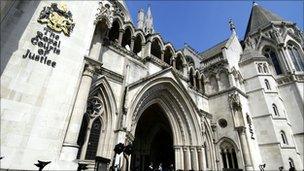Entertainer wins privacy order over affair
- Published

Court of Appeal: Upheld privacy of applicant
A married man working in entertainment has won an injunction preventing a newspaper revealing he admitted an affair with his well-known colleague.
Judges at the Court of Appeal said the man had a right to privacy because of how the story could affect his family.
They said someone can be protected from prurient news stories if publication could damage the privacy of children.
The judgement overturns a High Court ruling that would have allowed the News of the World to publish the story.
The father-of-two, referred to in the judgement as ETK, sought the injunction against the Sunday newspaper after journalists learnt that he had begun an affair in November 2009 with his colleague, referred to as X.
The pair would be both known to a "sector of the public", .
ETK's wife had become suspicious and confronted him. He admitted the affair - and then promised to end it for the sake of their teenage children.
However, Lord Justice Ward said the couple's attempts at reconciliation led to problems at work for the former lovers.
He said: "The appellant told [the employers] that he would prefer in an ideal world not to have to see her at all and that one or other should leave but both accepted that their working commitments did not then make that possible," said the judge.
"In December 2010 their employers informed X that her services would no longer be required, explaining publicly that it was a convenient moment to make this change.
"She was, understandably, upset and angry and may even have threatened to take proceedings against the employer."
Competing rights
At the initial High Court hearing, Mr Justice Collins backed the newspaper's right to publish the story because it had wanted to reveal the real cause for X leaving her employment.
But overturning that decision, Lord Justice Ward, supported by Lord Justices Laws and Moore-Blick, said the newspaper's right to publish did not outweigh the right of ETK's children to privacy.
"The purpose of the injunction is both to preserve the stability of the family while the appellant and his wife pursue a reconciliation and to save the children the ordeal of playground ridicule when that would inevitably follow publicity," said Lord Justice Ward.
"They are bound to be harmed by immediate publicity, both because it would undermine the family as a whole and because the playground is a cruel place where the bullies feed on personal discomfort and embarrassment.
"The benefits to be achieved by publication in the interests of free speech are wholly outweighed by the harm that would be done through the interference with the rights to privacy of all those affected, especially where the rights of the children are in play.
"The reasons for her leaving may interest some members of the public but the matters are not of public interest. Publication may satisfy public prurience but that is not a sufficient justification for interfering with the private rights of those involved."